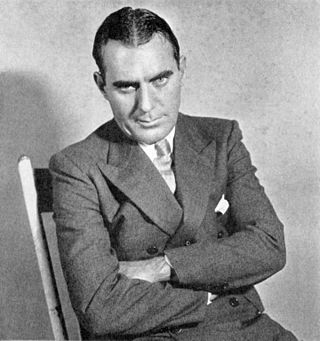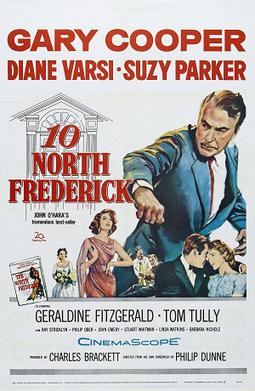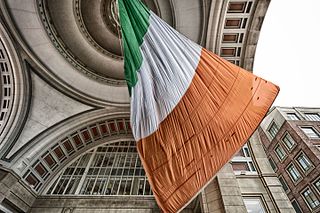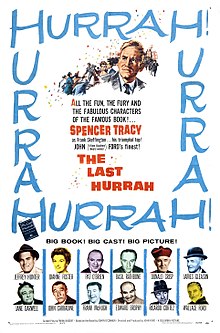
Spencer Bonaventure Tracy was an American actor. He was known for his natural performing style and versatility. One of the major stars of Hollywood's Golden Age, Tracy was the first actor to win two consecutive Academy Awards for Best Actor, from nine nominations. During his career, he appeared in 75 films and developed a reputation among his peers as one of the screen's greatest actors. In 1999, the American Film Institute ranked Tracy as the 9th greatest male star of Classic Hollywood Cinema.

Father of the Bride is a 1950 American romantic comedy film directed by Vincente Minnelli from a screenplay by Frances Goodrich and Albert Hackett, based on the 1949 novel of the same name by Edward Streeter. The film stars Spencer Tracy, Joan Bennett, and Elizabeth Taylor, and follows a man trying to cope with preparations for his daughter's wedding. Father of the Bride was nominated for Academy Awards for Best Picture, Best Writing, Screenplay, and Best Actor in a Leading Role.

James Michael Curley was an American Democratic politician from Boston, Massachusetts. He served four terms as mayor of Boston from 1914 to 1955. Curley ran for mayor in every election for which he was legally qualified. He was twice convicted of criminal behavior and notably served time in prison during his last term as mayor. He also served a single term as governor of Massachusetts. He is remembered as one of the most colorful figures in Massachusetts politics.
Edwin Greene O'Connor was an American journalist, novelist, and radio commentator. He won the Pulitzer Prize for Fiction in 1962 for his novel The Edge of Sadness (1961). His ancestry was Irish, and his novels concerned the Irish-American experience and often dealt with the lives of politicians and priests.

The Last Hurrah is a 1956 novel written by Edwin O'Connor. It is considered the most popular of O’Connor's works, partly because of a 1958 movie adaptation starring Spencer Tracy. The novel was immediately a bestseller in the United States for 20 weeks, and was also on lists for bestseller of that year. The Last Hurrah won the 1955 Atlantic Prize Novel award, and was highlighted by the Book-of-the-Month Club and Reader's Digest. The Last Hurrah received very positive critical reviews, including an "ecstatic" one from the New York Times Book Review.

William Joseph Patrick O'Brien was an American film actor with more than 100 screen credits. Of Irish descent, he often played Irish and Irish-American characters and was referred to as "Hollywood's Irishman in Residence" in the press. One of the best-known screen actors of the 1930s and 1940s, he played priests, cops, military figures, pilots, and reporters. He is especially well-remembered for his roles in Knute Rockne, All American (1940), Angels with Dirty Faces (1938), and Some Like It Hot (1959). He was frequently paired onscreen with Hollywood star James Cagney. O'Brien also appeared on stage and television.

Patrick John Morrison, better known by his stage name Patrick Wayne, is an American actor. He is the second son of movie star John Wayne and his first wife, Josephine Alicia Saenz. He made over 40 films, including eleven with his father.

State of the Union is a 1948 American drama film directed by Frank Capra about a man's desire to run for the nomination as the Republican candidate for President, and the machinations of those around him. The New York Times described it as "a slick piece of screen satire...sharper in its knife-edged slicing at the hides of pachyderm schemers and connivers than was the original." The film was written by Myles Connolly and Anthony Veiller and was based on the 1945 Russel Crouse, Howard Lindsay Pulitzer Prize-winning play of the same name.

Captains Courageous is a 1937 American adventure drama film starring Freddie Bartholomew, Spencer Tracy, Lionel Barrymore and Melvyn Douglas. Based on the 1897 novel of the same name by Rudyard Kipling, the film had its world premiere at the Carthay Circle Theatre in Los Angeles. Directed by Victor Fleming, it was produced by Louis D. Lighton and made by Metro-Goldwyn-Mayer. Filmed in black and white, Captains Courageous was advertised by MGM as a coming-of-age classic with exciting action sequences.

Dianne Foster was a Canadian actress of Ukrainian descent.

Up the River is a 1930 American pre-Code comedy film directed by John Ford, and starring Claire Luce, Spencer Tracy and Humphrey Bogart. The plot concerns escaped convicts, as well as a female convict. It was the feature film debut role of both Tracy and Bogart. Despite Bogart being billed fourth, Tracy's and Bogart's roles were almost equally large, and this is the only film in which they appeared together. Up the River is also Bogart's only film directed by John Ford. Bogart's image is featured with Luce on some of the film's posters rather than Tracy's since Bogart was the romantic lead with Luce. Fox remade the film in 1938 starring Preston Foster and Tony Martin playing their roles.

Cass Timberlane is a 1947 American romantic drama film directed by George Sidney and starring Spencer Tracy, Lana Turner and Zachary Scott. It was based on the 1945 novel Cass Timberlane: A Novel of Husbands and Wives by Sinclair Lewis, which was Lewis' nineteenth novel and one of his last.
The 30th National Board of Review Awards were announced in late December, 1958.
The Last Hurrah is a 1977 American made-for-television political drama film based on the 1956 novel The Last Hurrah, by Edwin O'Connor, and starring Carroll O'Connor. It was directed by Vincent Sherman and originally aired on NBC as a presentation of Hallmark Hall of Fame on November 16, 1977.
James Edward Grant was an American short story writer, screenwriter and film director, who contributed to more than fifty films between 1935 and 1971. He collaborated with John Wayne on twelve projects, starting with Angel and the Badman in 1947 through Circus World in 1964. Support Your Local Gunfighter was released in 1971, five years after his death.
Frank Stanley Nugent was an American screenwriter, journalist, and film reviewer. He wrote 21 film scripts, 11 for director John Ford. He wrote almost a thousand reviews for The New York Times before leaving journalism for Hollywood. He was nominated for an Academy Award in 1953 and twice won the Writers Guild of America Award for Best Written American Comedy. The Writers Guild of America, West ranks his screenplay for The Searchers (1956) among the top 101 screenplays of all time.

Ten North Frederick is a 1958 American drama film in CinemaScope written and directed by Philip Dunne and starring Gary Cooper. The screenplay is based on the 1955 novel of the same name by John O'Hara.

Spencer Tracy (1900–1967) was an American actor. His film career began in 1930 with Up the River ; and ended in 1967, with Guess Who's Coming to Dinner alongside Sidney Poitier and his longtime screen partner, Katharine Hepburn. Within this 37-year career, Tracy starred in 75 feature films and several short films.

Whipsaw is a 1935 American crime drama film directed by Sam Wood and starring Myrna Loy and Spencer Tracy. Written by Howard Emmett Rogers, based on a story by James Edward Grant, the film is about a government agent working undercover traveling across the country with an unsuspecting woman, hoping she will lead him to her gang of jewel thieves. The film was produced by Harry Rapf for Metro-Goldwyn-Mayer, and was released on December 18, 1935, in the United States.

People of Irish descent form the largest single ethnic group in Massachusetts, and one of the largest in Boston. Once a Puritan stronghold, Boston changed dramatically in the 19th century with the arrival of immigrants from other parts of the world. The Irish dominated the first wave of newcomers during this period, especially following the Great Irish Famine. Their arrival transformed Boston from an Anglo-Saxon, Protestant city into one that has become progressively more diverse. These people hired Irish as workers and servants, but there was little social interaction. In the 1840s and 50s, the anti-Catholic, anti-immigrant Know Nothing movement targeted Irish Catholics in Boston. In the 1860s, many Irish immigrants fought for the Union in the American Civil War, and that display of patriotism helped to dispel much of the prejudice against them.















